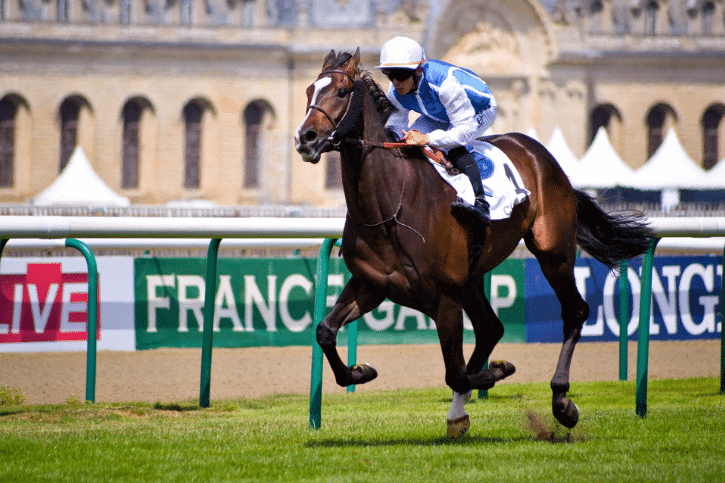Is Horse Racing Rigged?
The other day, while at the races, I lost a big bet.
I know you can’t win them all, and I was okay with it in the end, but sometimes losing a bet can be really frustrating.
I have to admit, I got so heated in the moment with that bet that I wanted to go over to the bookmaker and tell him the race was rigged and I want my money back.
I calmed down pretty quickly, and accepted my loss.
It did get me wondering, though, about the integrity of horse racing in general, and whether or not it can be rigged.
So, I decided to look into it.
Is horse racing rigged?
While corruption is far from unknown in the horse racing world, it’s exceedingly difficult to fix an entire race. Horses are unpredictable and you can never know how the race would go. Horse racing is frantically competitive and the levels of corruption and ‘fixing’ are very low.
So, no matter how badly you lost your bet, you probably weren’t being cheated out of your money.
It’s very hard to rig a horse race, though it can be done in some cases, so let’s look at how this can happen.
Is horse racing fixed?
Many types of institutions like horse racing have long suffered from a reputation that where there are big players and brass, there’s corruption to be found.
But it’s definitely wrong to assume that the horse racing industry is endemically corrupt, and that fixing horse races is commonplace.
The fact is, though, that for the most part, horse racing is just incredibly competitive.
In order for any jockey or trainer to make a real career out of it, they need to be able to do some by winning legitimate races.
If they can’t make a living this way, they won’t be able to make one at all in horse racing.
That said, it isn’t unheard of.
It in some ways depends on what exactly you mean by fixing.
The idea that all races are simply well orchestrated performances and everyone involved knows the outcomes is patently not the case.
Horses are too unpredictable, and there are far too many variables to be able to do this.
So, some individual jockeys and trainers may attempt to fix the race in a few ways.
Let’s look at how they could.
How are horse races fixed?
One of the most common and difficult to discourage ways that bettors attempt to fix races is by making arrangements with jockeys for them to throw the race—i.e., to lose on purpose.
In the past, you could only bet on a horse to win; now you can lay a horse to lose.
Betting exchanges make this kind of corruption more common, although it is still far from the norm. jockeys typically have a lot more to gain by just attempting to legitimately win a race.
On the other hand, a horse race is also thought to be fixed if a trainer has been doping their horse.
Horses that are given performance enhancing drugs are usually caught by the drug tests but sometimes they do slip through and one horse is given a huge advantage.
Drug tests are becoming better and better, though, and it’s much harder to slip through the cracks now.
How is race fixing monitored?
There are quite a few ways that races are monitored to reduce the possibility of fixing.
All races are watched and reviewed by a panel of stewards.
They are responsible for identifying suspicious behavior both during and after the race.
If a horse runs very well or not as well they should have, the stewards may ask for an explanation from the jockey and the owner.
Any horse can be inspected at any time and tested for doping.
These tests pick up banned substances very quickly.
There are also many rules in place to make sure that jockeys and owners can’t profit off betting on their own races and affecting the outcome accordingly.
Jockeys and owners are not allowed to bet on races they are involved in, whether on their own horse or others, in most racing traditions.
One other type of fixing you may be concerned about as a punter is the fixing of racing odds.
Are horse racing odds accurate?
The thing to remember is that, at the end of the day, the bookmakers set the odds and they can theoretically set the odds to whatever they want.
That said, the odds are always taken with strict and proper consideration of that horse’s actual performance.
Odds are based partly on that horse’s chance of winning.
However, the odds are actually set based on the percentage of money bet on that horse.
So, the odds are totally accurate in that sense.
They reflect the betting odds, rather than the horse’s odds of actually winning.
So they do not reflect the odds of a horse winning the race, just of the popularity of that horse for betting.
So, odds are perfectly accurate in that sense.
Horse racing is a very old tradition with a lot of history, and the industry has had many years to weed out cheaters and fixers.
Races can certainly be rigged, owners, trainers and jockeys certainly can conspire to break down the integrity of the races.
However, this happens in only a tiny majority of cases, as it’s simply very difficult to effectively rig a horse race in any way.
Don’t fret if you lost a bet; the race probably wasn’t rigged against you.
Just try again next time.
